That Championship Fantasy Baseball Season, Part 2
When someone wins more than $300,000 in fantasy baseball, it's worth a deep dive to see what we can learn and what strategies can be borrowed. The following is a breakdown of the second half of Phil Dussault's 2021 season in the National Fantasy Baseball Championship. For a breakdown of Weeks 1-14, click here.
SEE ALSO:
Here are Dussault's roster moves heading into Week 15:

After an incredible 29 games in June and early July (.288 with 23 runs, 16 home runs, and 30 RBI over 104 at-bats), Kyle Schwarber suffered a hamstring injury. So Dussault dumped him for Harrison Bader ($35) without ever saying goodbye. Essentially, Schwarber gave his team half of a season in power in 32 easy days. Bader missed all but 22 games (.219 with four home runs, nine RBI and three stolen bases over 73 at-bats) over the first three months with forearm and rib issues. Over the next month, he hit .357 with 13 runs, five home runs, 18 RBI and three steals over 84 at-bats.
Tylor Megill ($28) earned two spot starts in late June (five runs, 12 runs and two home runs over 9.1). He ended up giving Dussault July insurance for Jacob deGrom when he pitched well over five starts (1.04 ERA and 27 strikeouts over 26 innings).
Ranger Suarez ($28) picked up a save on July 3, triggering Dussault's interest for another closing arm. He ended up being a great find while working in a dual role between relieving and starting. Over his final 77 innings, he went 5-3 with four saves while posting a 1.52 ERA, 1.10 WHIP, and 81 strikeouts over 77 innings.
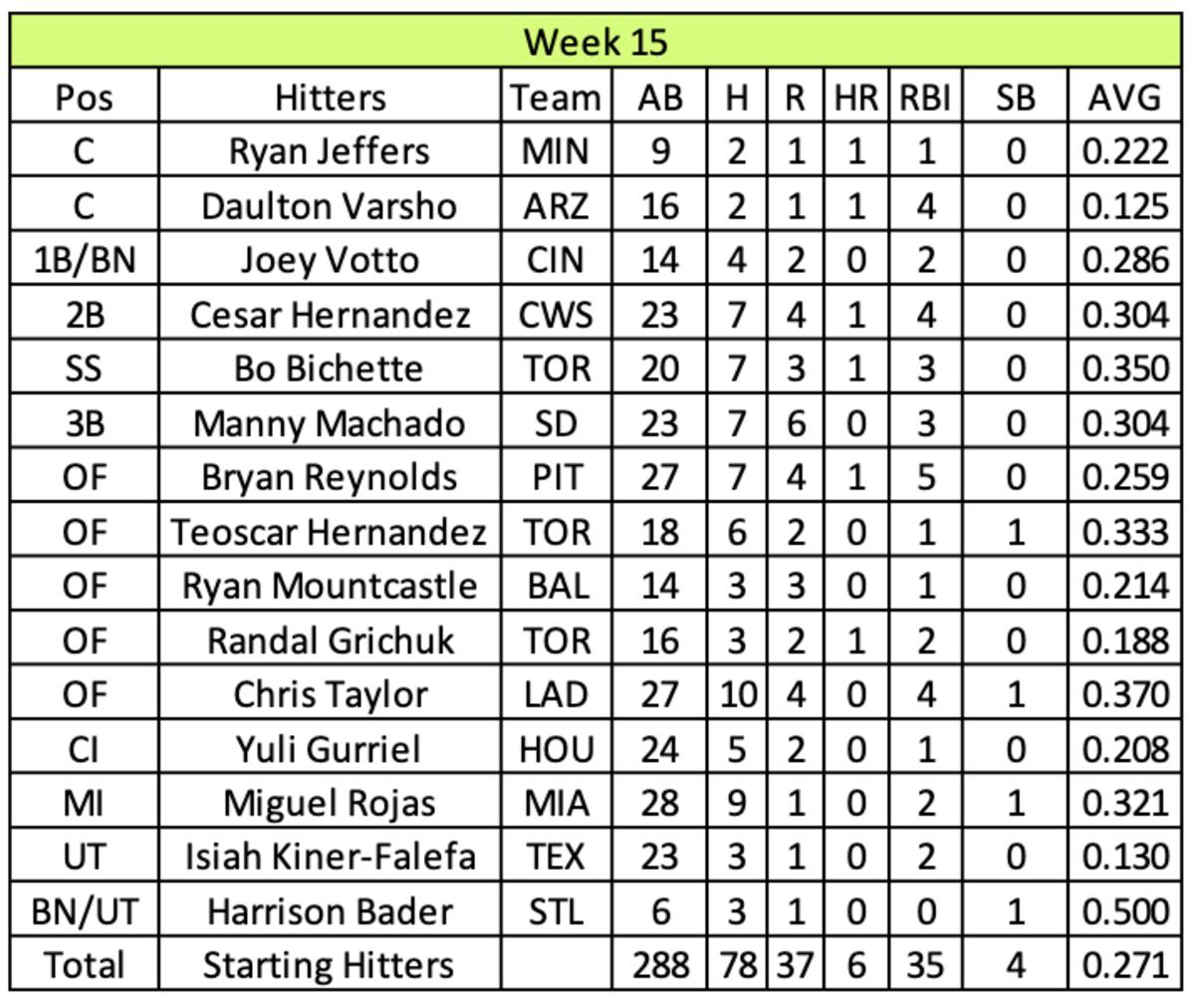
After gaining many offensive fantasy points in June, Dussault’s team came out flat in the first full week in July. His team lost some at-bats at catcher and outfield. Overall, he fell short of his targets in runs (37), home runs (6), and RBI (35).
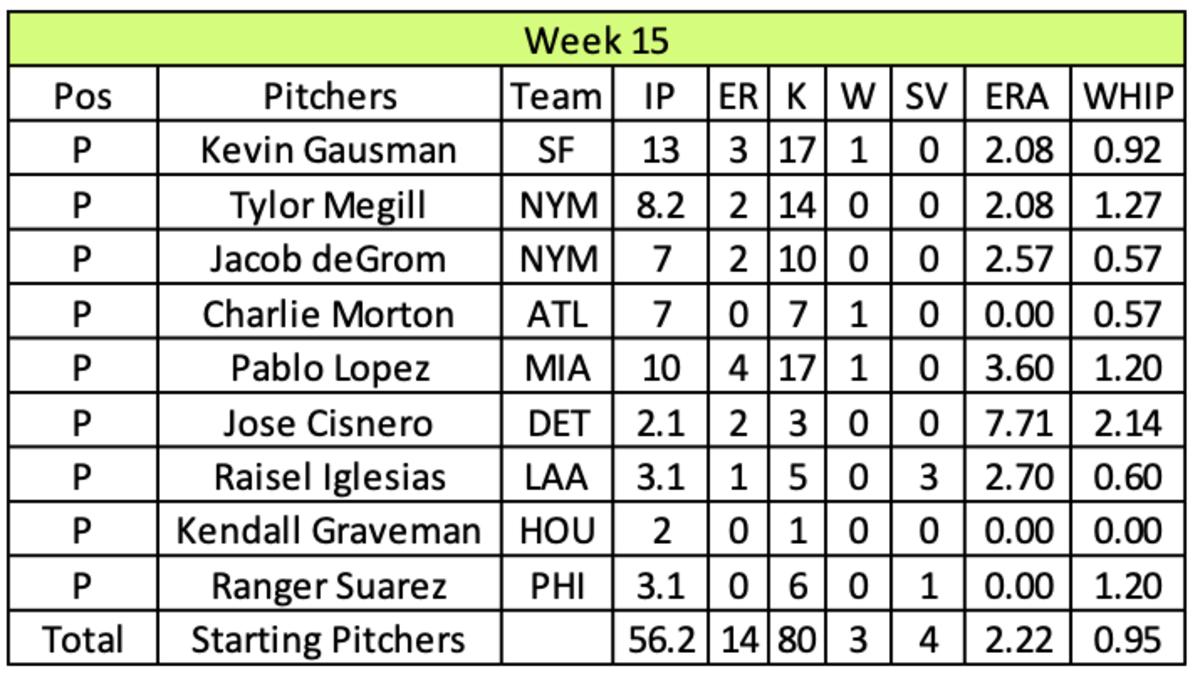
He posted a dominating week in strikeouts (80) over 56.2 innings despite wheeling out four possible closers. Three of his starters pitched twice, leading to two wins. Ranger Suarez and Raisel Iglesias combined for four saves with a 1.35 ERA and 11 strikeouts over 6.2 innings.
Dussault left two winning starts on his bench (Carlos Rodon and Robbie Ray). They combined to pitch 13 innings with one run, 19 strikeouts and a win.

The last time Steven Matz pitched for his team came in Week 9 in a double-start week. Dussault flipped him for Orlando Arcia ($6). The next dance at catcher came with Jake Rogers ($2). Anthony Bender ($29) looked to be an upside arm with a chance at closing for the Marlins.
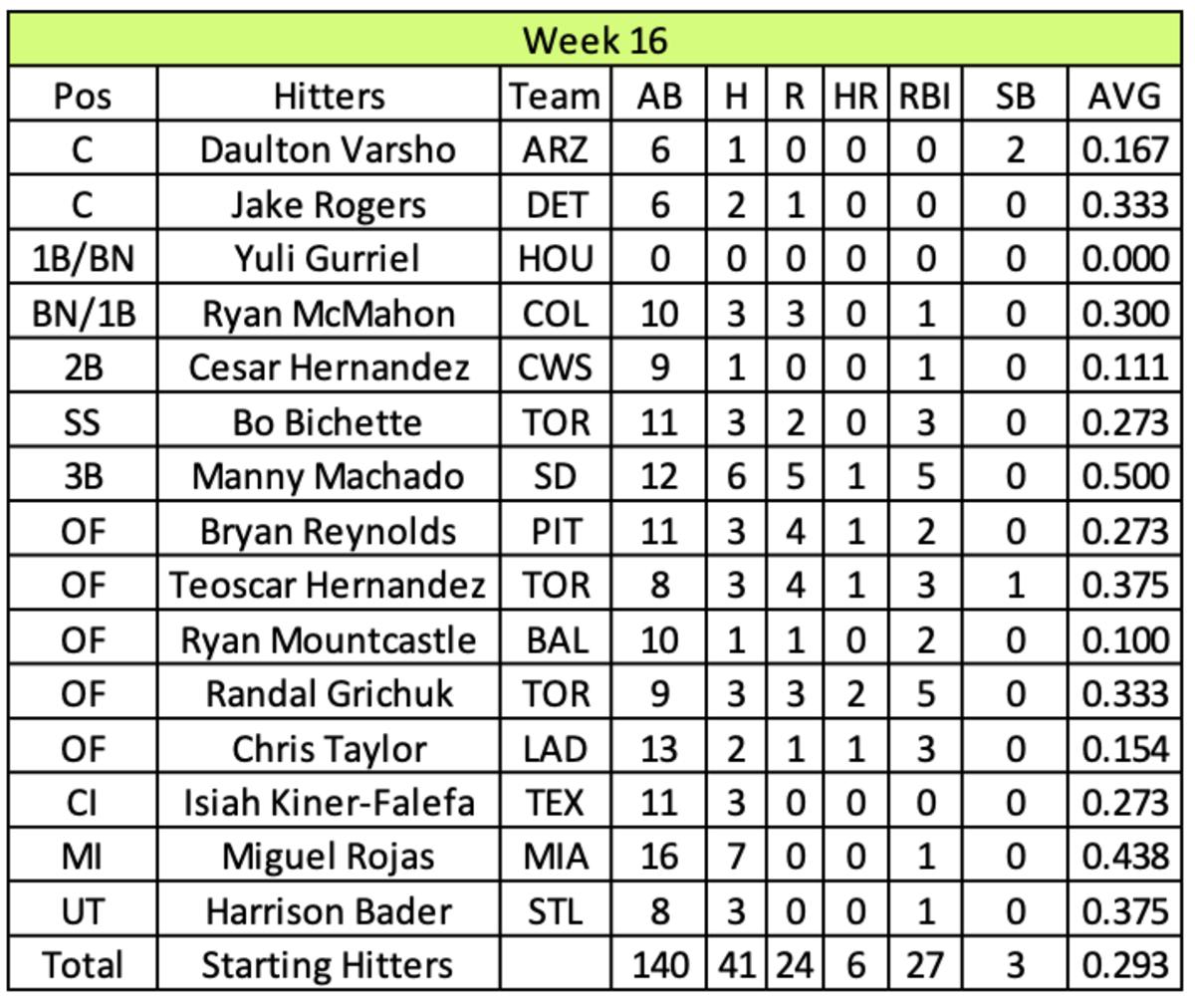
His team finished with a steady five-category showing over a half week of games during the All-Star break. Daulton Varsho chipped in with a pair of needed steals. Manny Machado (6-for-12 with five runs, one home run and five RBI) was the best player for the week.
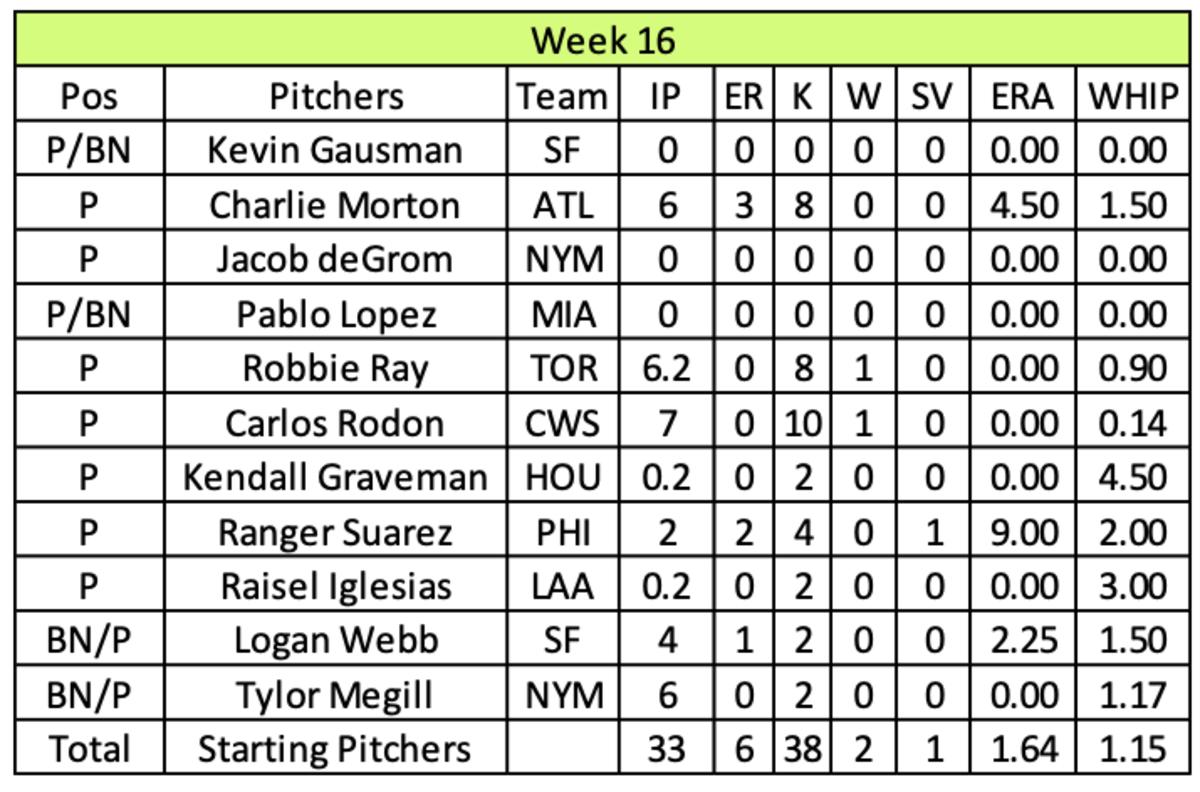
Lining up nine pitchers coming out of the break is challenging, with each major league team jockeying their starting pitchers over the weekend. He took a zero out of three arms while looking like he made two mid-week pitching moves (seems strange to see). Nevertheless, Dussault finished with another solid pitching week across the board.

Dussault lost Pablo Lopez to a right shoulder injury (rotator cuff), leading to another quick drop for Mike Mayers ($2). Tyler Wells ($8) was another shot at the closing dartboard. Jake Rogers lasted only six at-bats before earning his way back to the free-agent pool. The next day, he scratched for the Tigers’ starting lineup with an arm issue before landing on the injury report with a right elbow injury that required surgery in September.
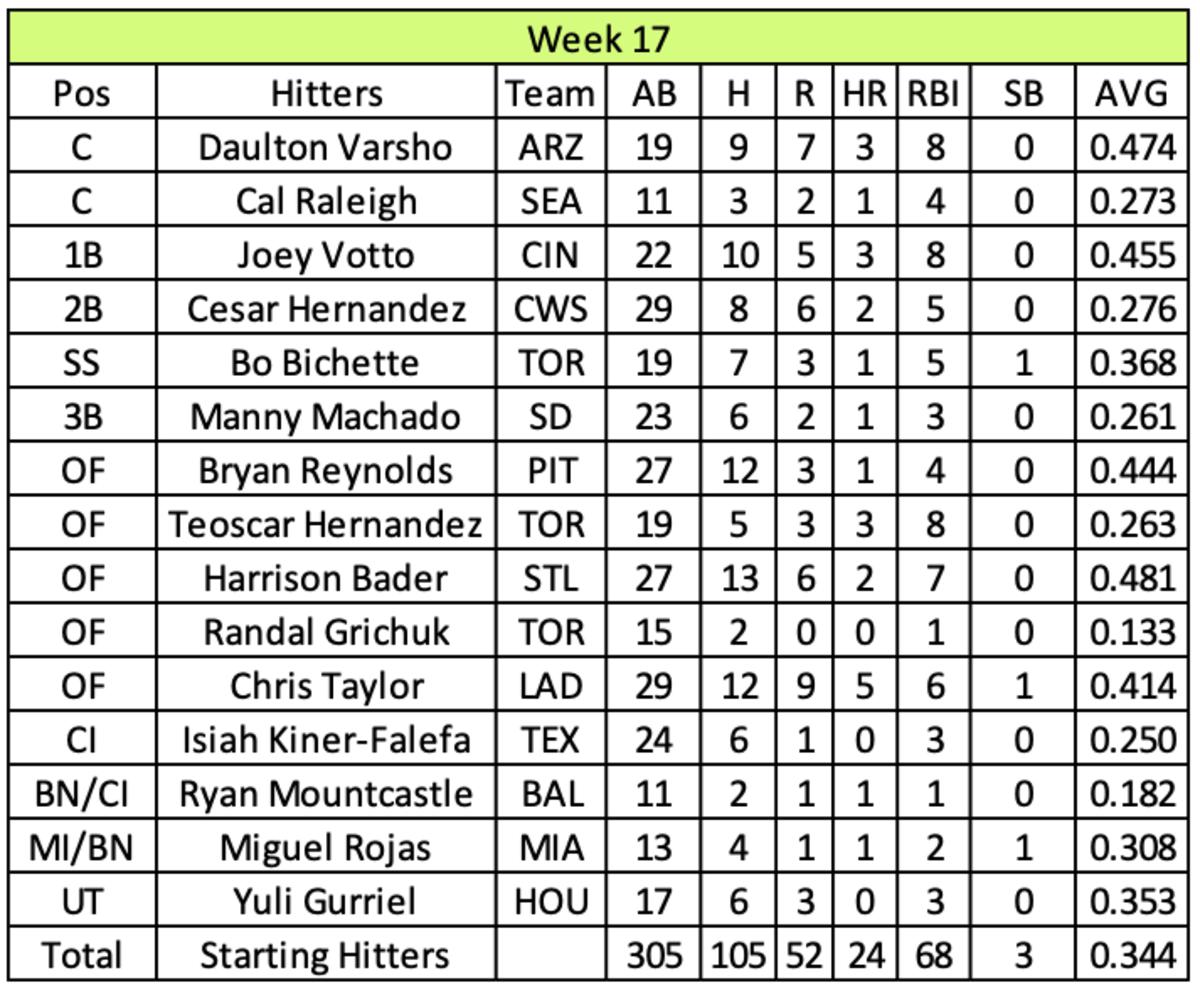
Dussault’s offense didn’t lose a beat after the All-Star break. Twelve batters smashed a home run, highlighted by Daulton Varsho (.474/3/8), Joey Votto (.455/3/8) and Chris Taylor (.414/5/6/1). In addition, his catching dart of the week (Cal Raleigh) provided a home run and four RBI. Bryan Reynolds and Harrison Bader hit a combined 0.463 with nine runs, three home runs and 11 RBI. His team gained ground in batting average, runs, home runs and runs batted in.
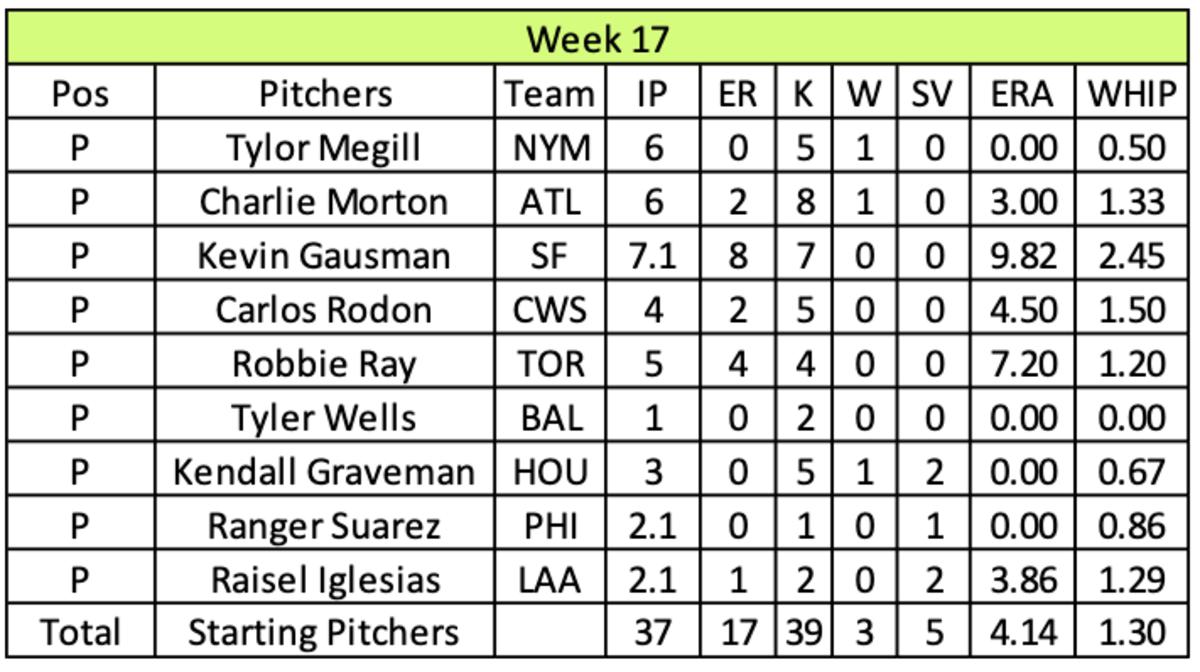
The quest to make up ground in saves continued in Week 17, leading to Dussault going with five starters and four relievers. His team picked up five saves and a vulture win by Kendall Graveman. However, he had no double starters, and two of his arms pitched poorly (Kevin Gausman and Robby Ray). Dussault finished with only 37 innings pitched and weakness in strikeouts (39).

This week's only two additions in the waiver wire were Dillon Tate ($3) and Kyle Finnegan ($3). Both darts were dictated toward finding another option for saves.
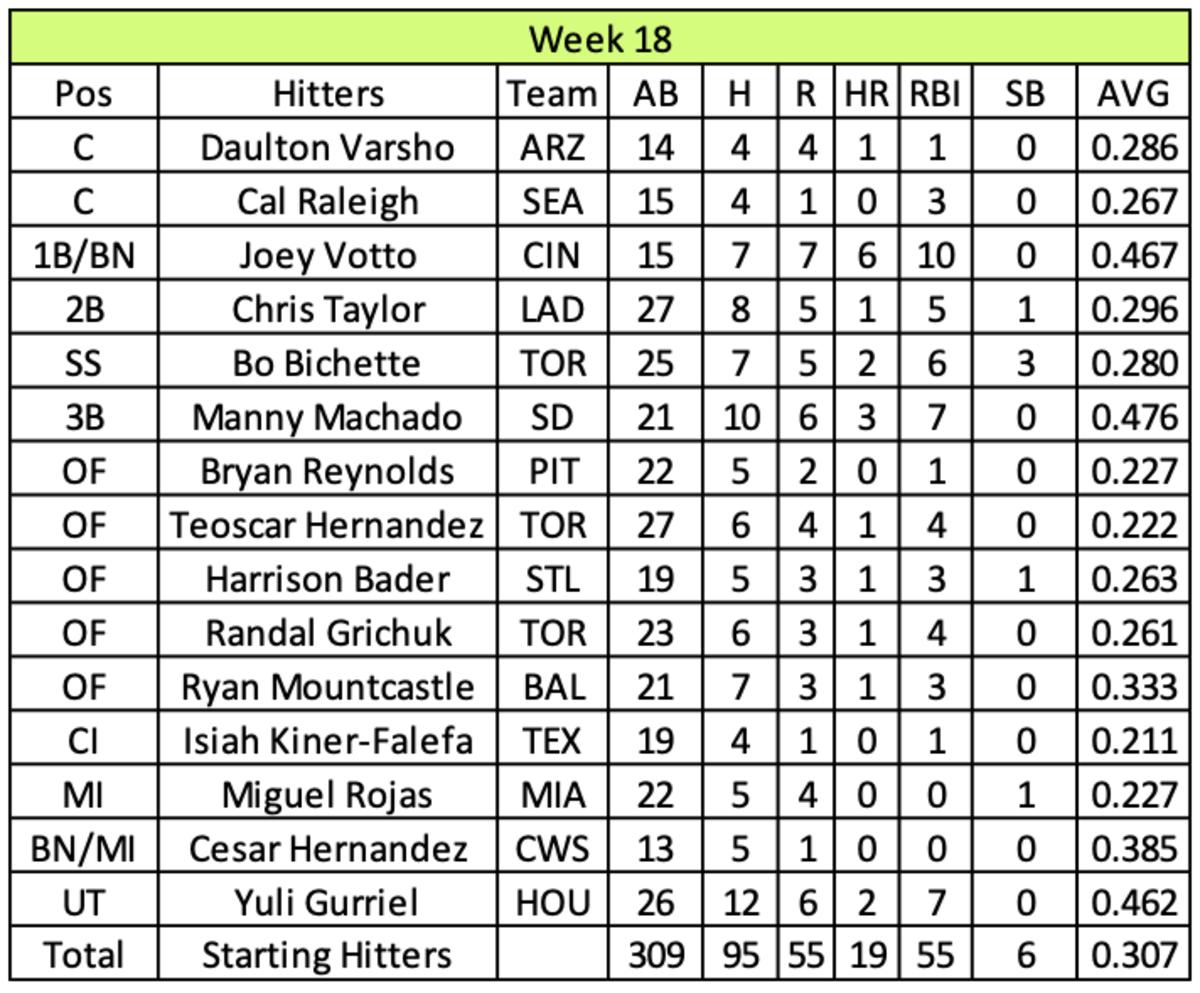
As the calendar approached the end of July, Dussault put his feet on the desk and watched his batters produce almost every day. He finished with another impressive five-category week. His push in runs (55), home runs (19) and RBI (55) should create a cushion to add more base stealers to his starting lineup without losing too many overall league points. Joey Votto delivered seven runs, six home runs and 10 RBI over only 15 at-bats while Manny Machado found his hitting shoes (0.476 with six runs, three home runs and seven RBI). Bo Bichette carried the stolen bases category (3).
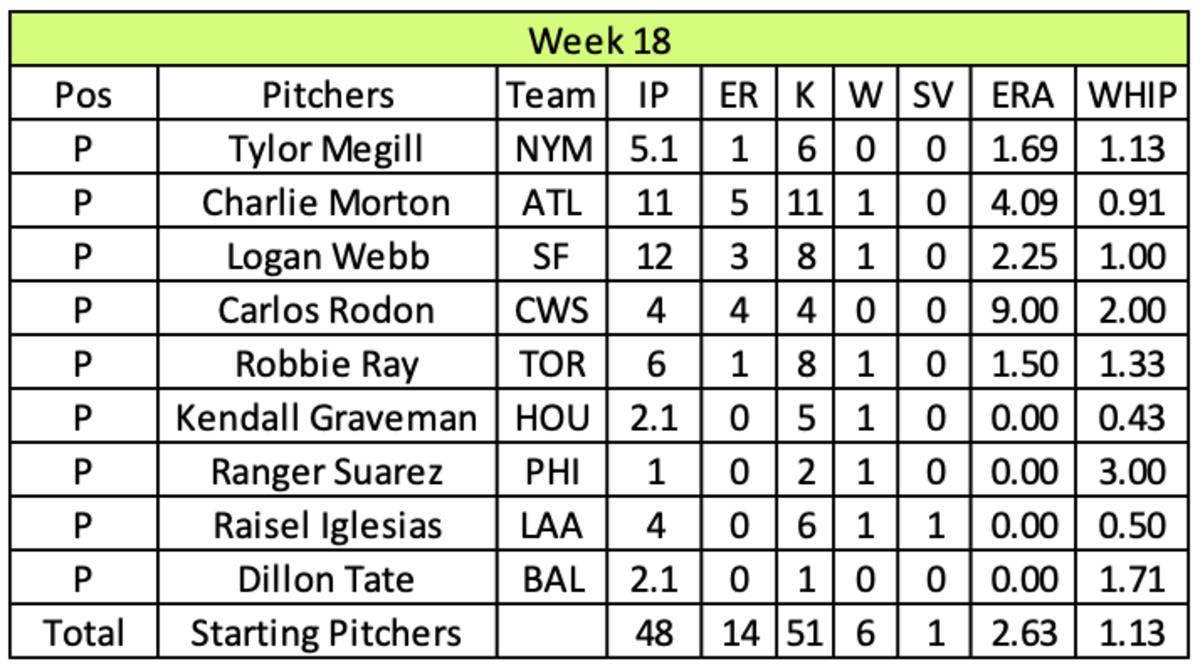
Despite another four-closer week, his team only picked up one save, but his relievers secured three wins. He held serve in strikeouts (51) while gaining an edge in wins (6), ERA (2.63) and WHIP (1.13). Carlos Rodon failed to log over four innings for the second straight week.

With his team placed well in ERA and WHIP, Dussault moved on from the injured Jacob deGrom. August 1 should be an important date for fantasy owners when carrying injured players in the NFBC. If a player is going to be out for a month, the bench spot becomes more valuable for team flexibility. A four-week injury could quickly turn into six weeks or even season-ending. Dylan Floro ($23) was another shot at saves, while Dussault invested in two bats (Rafael Ortega for $8 and Chas McCormick for $3) to possibly help the stolen base category. The next dance at C2 came with the addition of Johan Heim ($3).
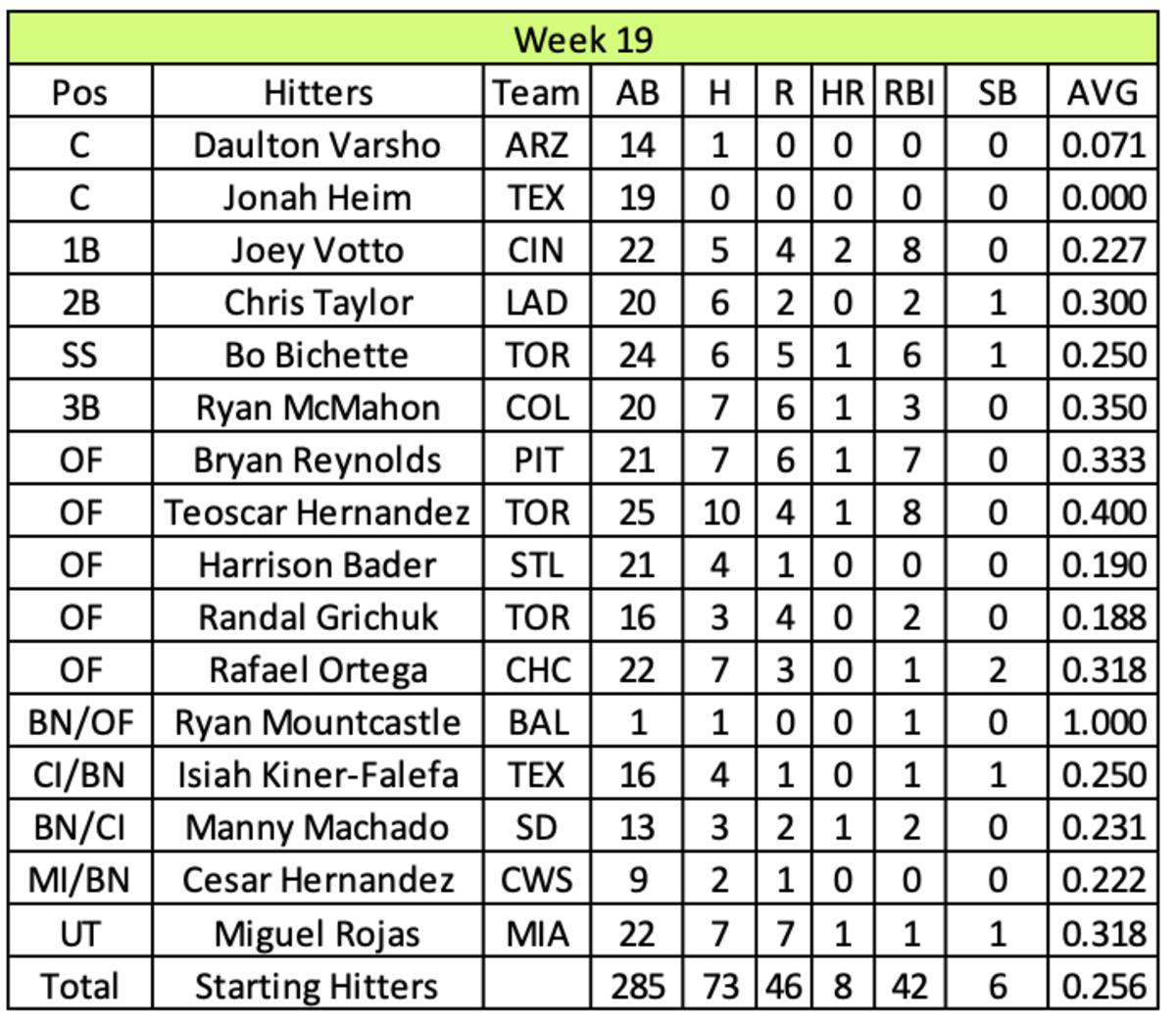
Daulton Varsho and Johan Heim combined for one hit in 33 at-bats with empty production. However, Dussault’s new base-stealing toy (Rafael Ortega) went 7-for-22 with three runs, one RBI and two steals. Overall, Dussault’s team turned in a steady week with a slight gain in stolen bases (6). Chas McCormick had an excellent showing on his bench (.350 over a home run, two RBI and one steal).
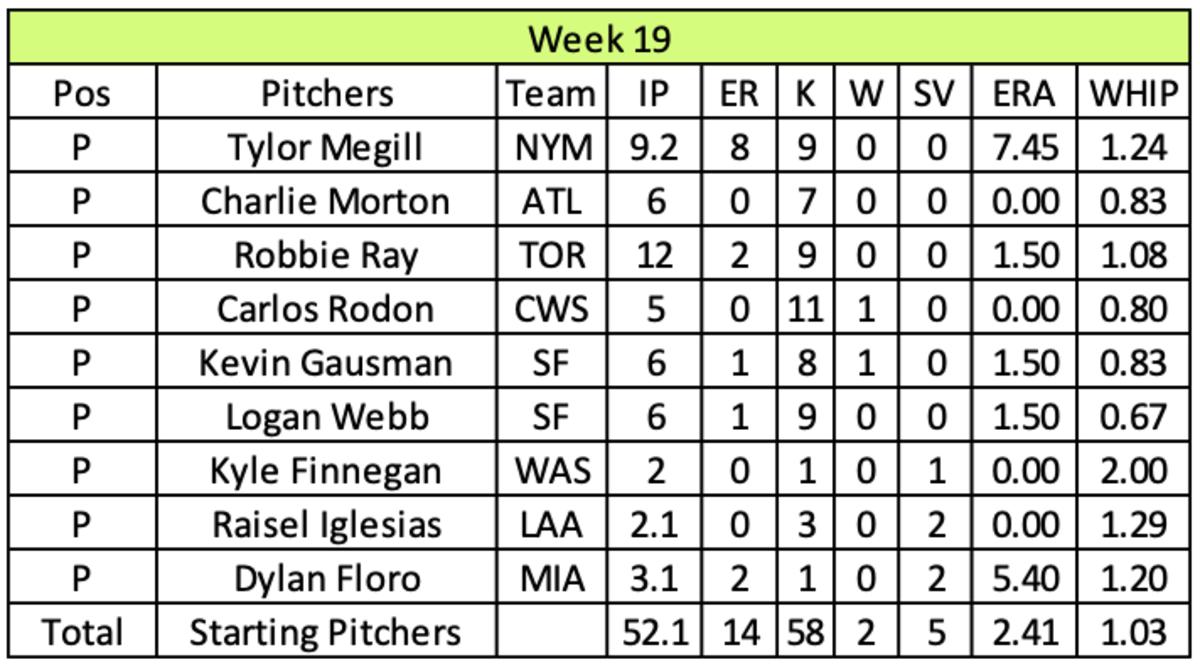
The wheels started to come off the Tylor Megill bus (eight runs over 9.2 innings), but the rest of his starting staff pitched well. His three relievers delivered five saves. Other than wins (2), Dussault’s pitching staff had another winning week.

Whenever Dussault needed to win a player, his bidding was spot on the market. A late-July finger injury to Taylor Rogers ended up being season-ending, creating a closing opportunity for Alex Colome ($34). No one fought for him on the waiver wire despite earning three saves for the week before being picked up. Over the final two months of the season, Colome posted a 3.38 ERA with two wins, 15 saves, and 22 strikeouts over 26.2 innings. Niko Goodrum ($6) was a flier for speed who returned from a month on the injured list. Unfortunately, he stayed healthy for only two days.
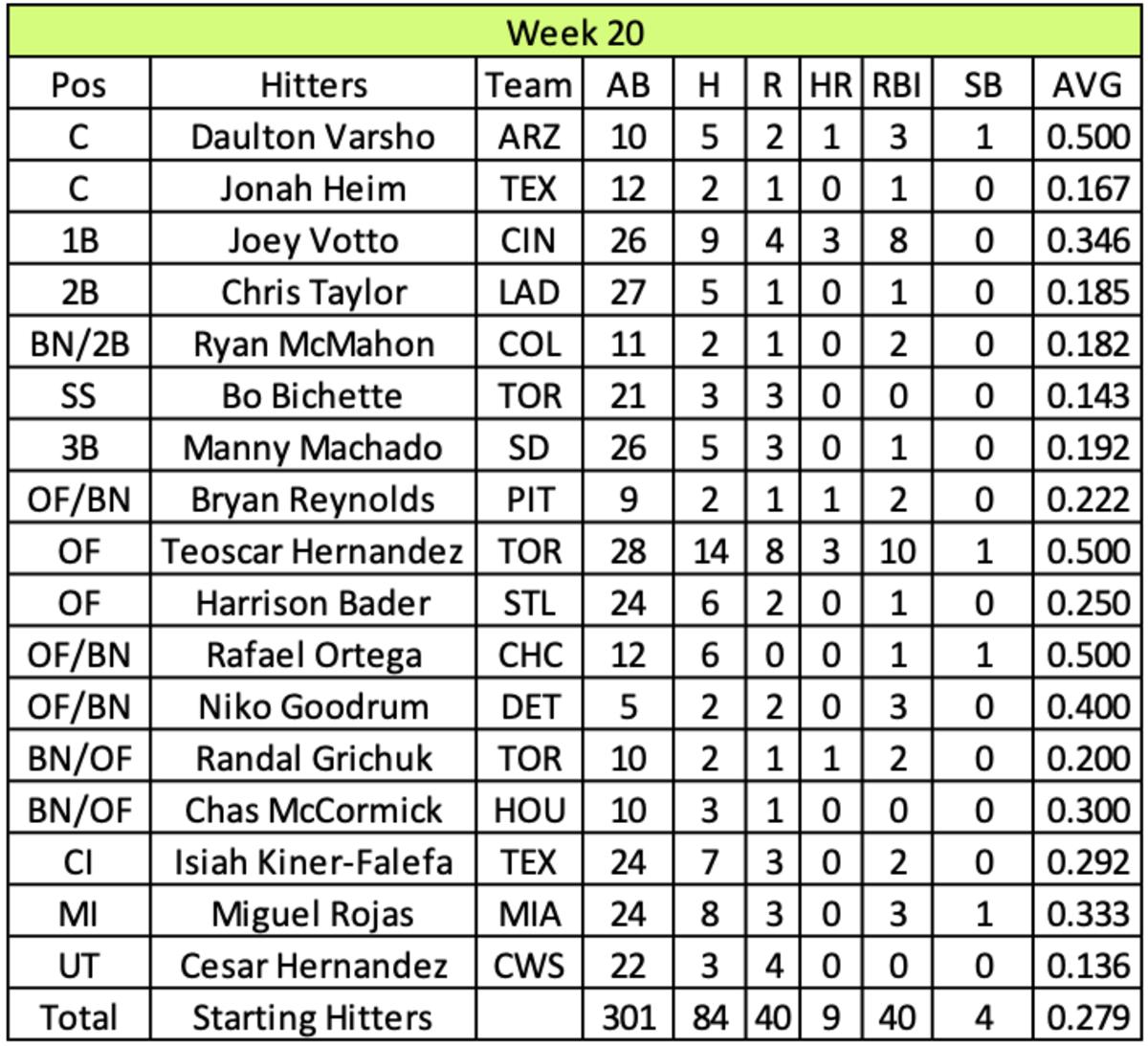
The highlights on offense came from Joey Votto (.346/4/3/8) and Teoscar Hernandez (.500/8/3/10/1) in Week 20. Unfortunately, other than batting average (.279), the rest of his offensive output fell slightly below his targets for the week. Since the All-Star break, his team averaged close to 300 at-bats per week.
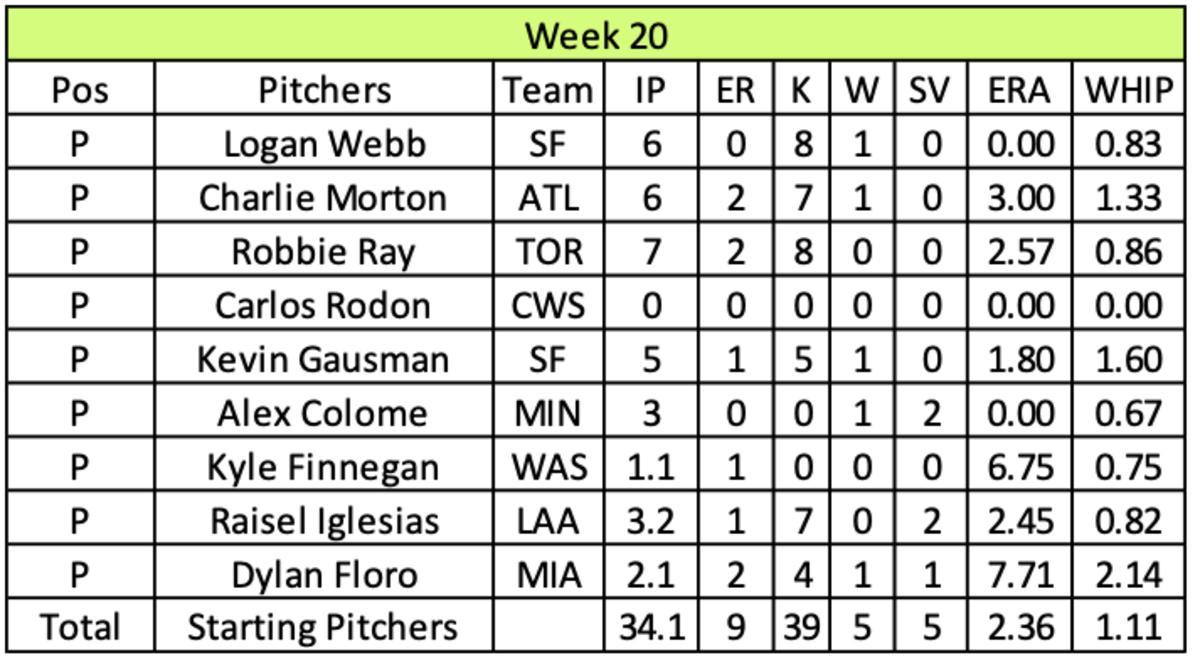
Despite two of his relievers struggling, Dussault earned five saves for the second week in a row. He wheeled out four closers, and their two vulture wins helped him gain a notch in that category. His one strike for the week was a zero out of Carlos Rodon. Dussault finished with only 34.1 innings pitched and weakness in strikeouts (39), but the rest of his pitching stats were outstanding for the week.

By now, you know the theme for this roster – find the next closing option. Dussault won Joe Barlow $24 to $19 while sending Niko Goodrum packing after landing back on the injured list.
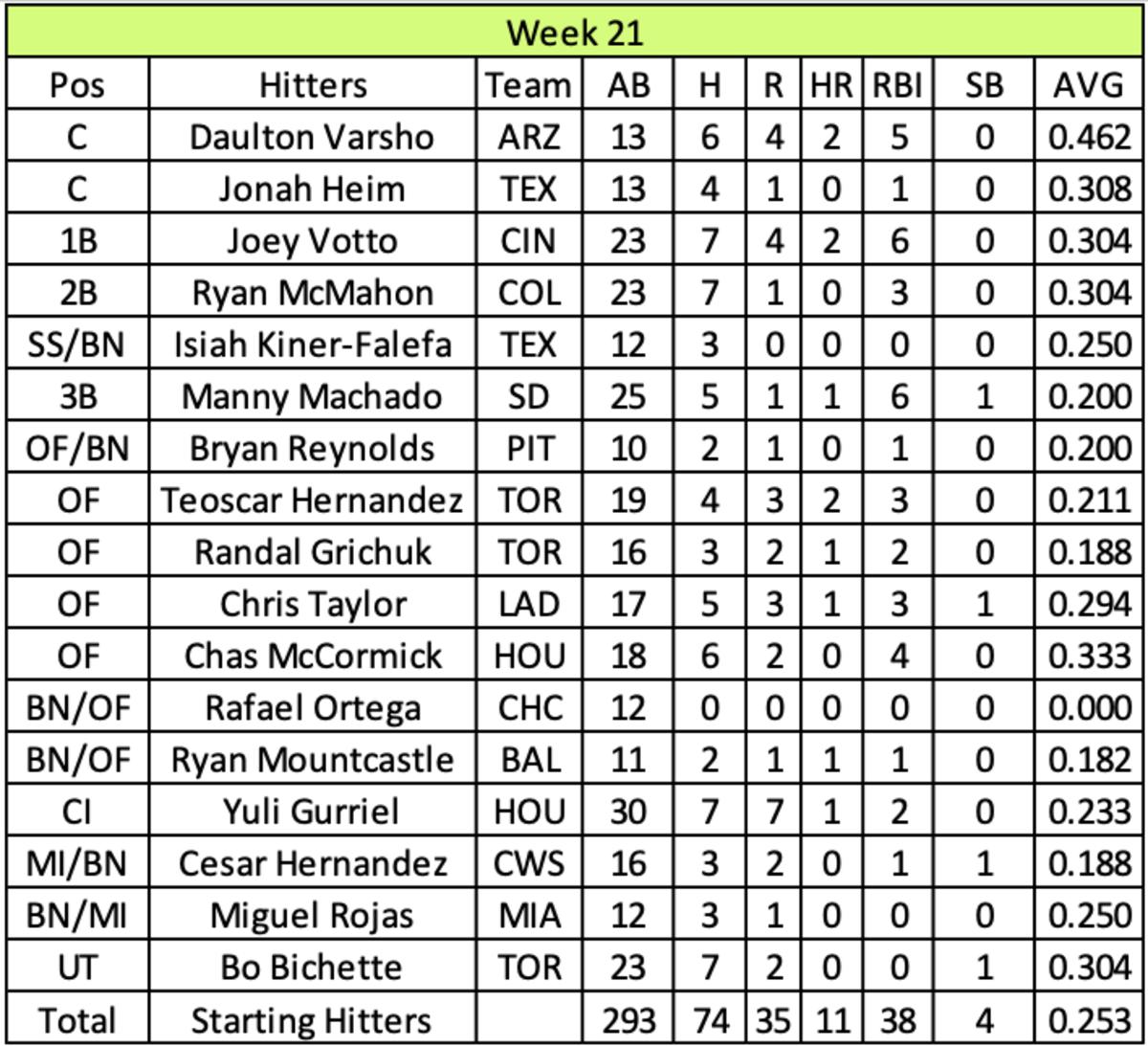
The offensive momentum started to wane in the middle of August. Over the past two weeks, his team failed to gain ground in any offensive category. Dussault appeared to use six players to fill three roster slots, but those options combined for only 13 hits over 73 at-bats with one home run, three RBI and one steal. Joey Votto (.304/2/6) and Daulton Varsho (.462/2/5) were the most productive players in Week 21.
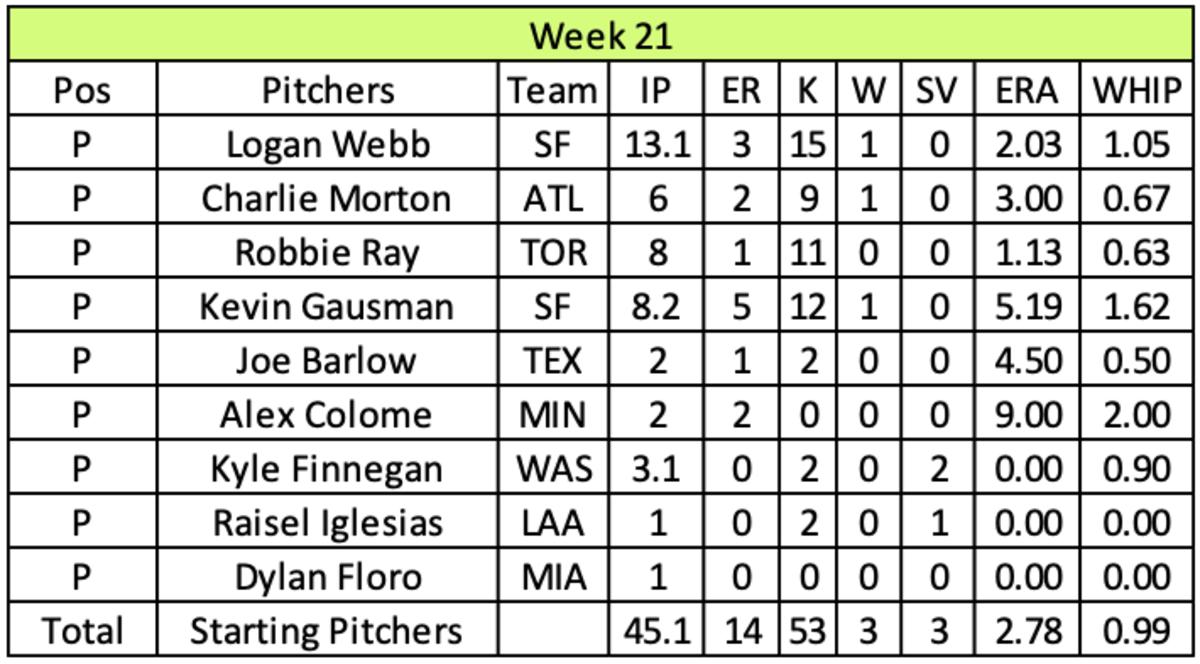
The next man up in the starting rotation was Logan Webb. Over his seven starts since the All-Star break, he went 3-0 with a 1.91 ERA, 0.97 WHIP and 45 strikeouts over 42.1 innings. Charlie Morton, Robbie Ray and Kevin Gausman combined for 32 strikeouts over 22.2 innings while adding a pair of wins. Dussault lined up five closers, but they delivered only three saves. Overall, his pitching output pushed slightly higher in the standings despite only having 45.1 innings on the week.

With no saves on the week, Dussault launched Joe Barlow back into the free-agent pool in favor of the speedy Yonny Hernandez ($8).
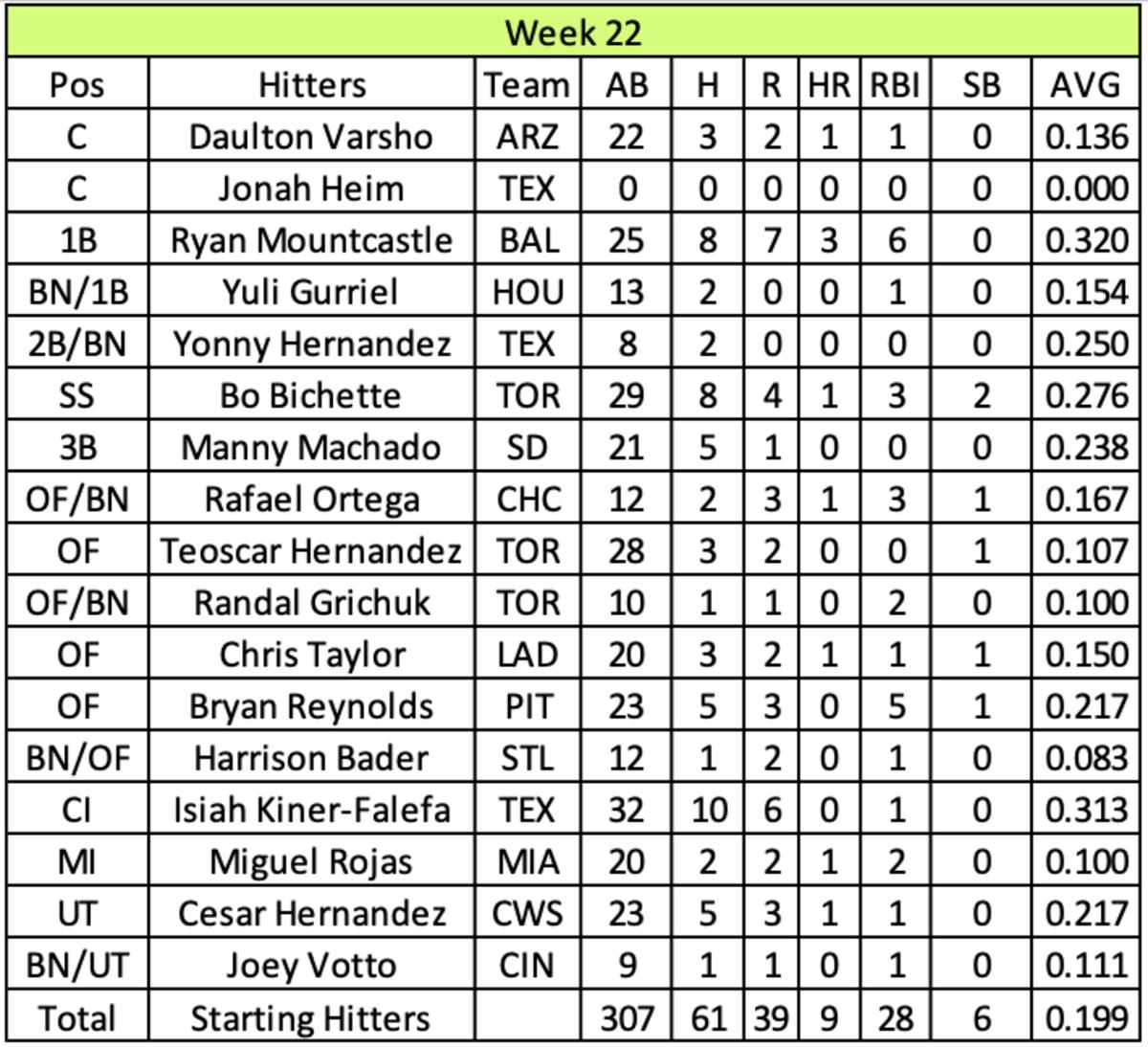
After another quiet week of offense, Emmett Ruland thought he had a chance to run down Dussault for the overall standings. Dussault’s weakness in batting average (.199) had to be disappointing while taking a significant negative in RBIs (28). On the positive side, his at-bats (307) remained strong with a slight uptick in steals (6). Ryan Mountcastle (.320/3/6) was the stud of the week.
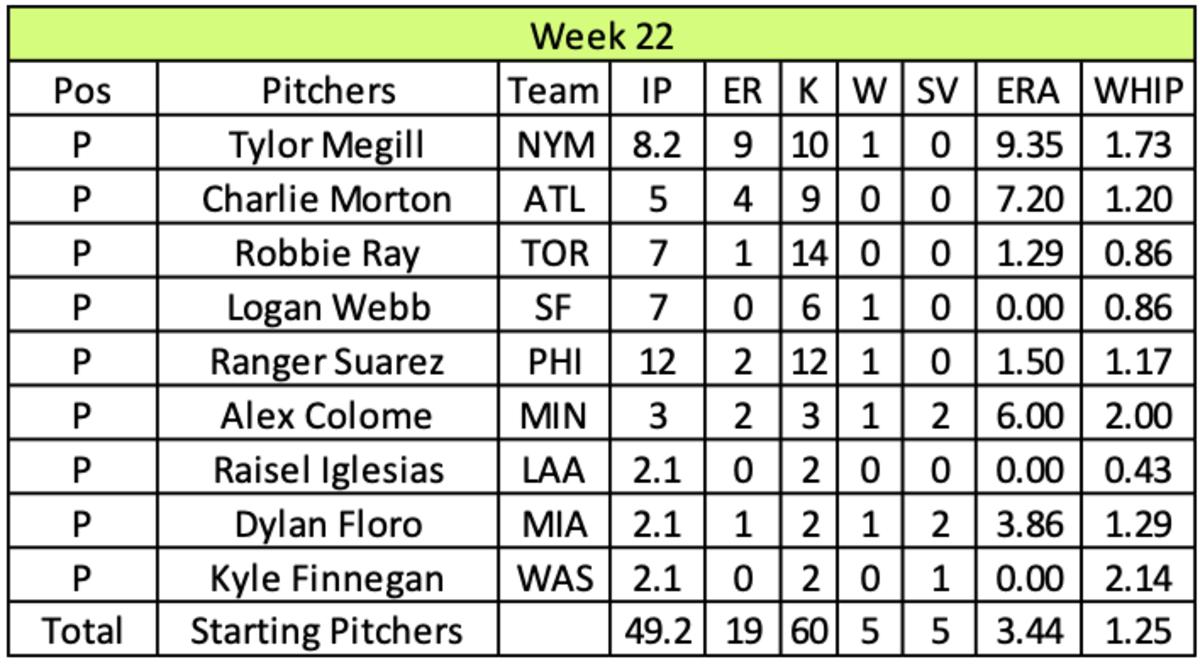
Ranger Suarez gets his first chance at starting for Dussault after transitioning from the closing role for the Phillies. He turned in two stellar outings, leading to two runs over 12 innings with a win and 12 strikeouts. His four relievers produced two wins and five saves. Most of the damage to the pitching stats came from Tylor Megill (nine runs over 8.2 innings with a win and 10 strikeouts). Overall, his pitching gained some ground in wins (5), saves (5) and strikeouts (60).

Reflecting on last season, I was surprised to see Frank Schwindel ($6) in the player pool in a 15-team league in late August. He earned starting at-bats for the Cubs on August 3 after Chicago cleaned house at the trade deadline. Over 24 games before Dussault picked him up, Schwindel hit .352 with 14 runs, four home runs and 16 RBI. His bat stayed productive over his final 31 games (.338 with 28 runs, nine home runs, 24 RBI and two steals over 133 at-bats). Roman Urias ($2) appeared to be an injury cover, while Dussault added two more catching options (Ryan Jeffers – $3 and Kevin Smith – $2).
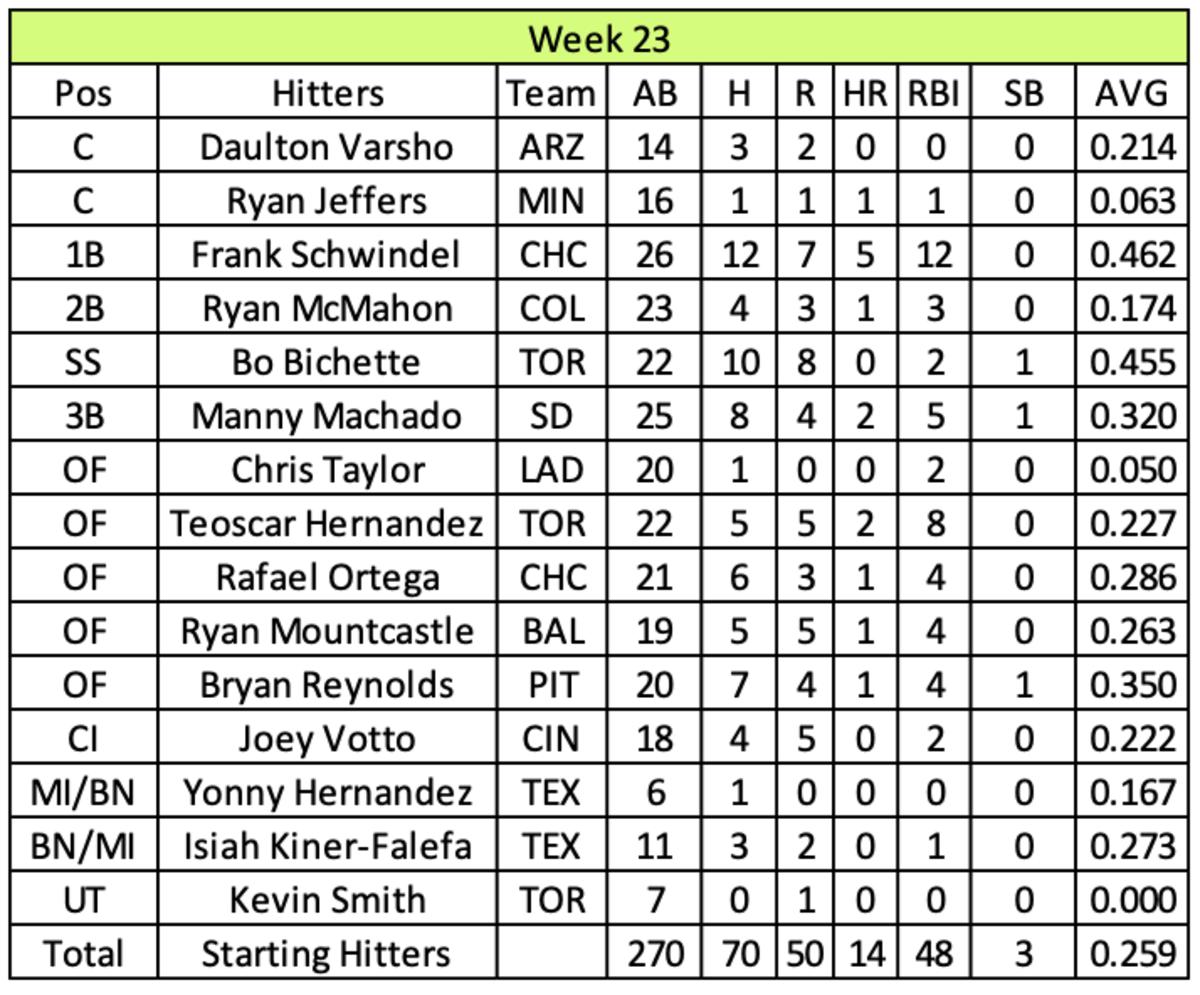
The addition of Frank Schwindel instantly paid dividends. He went 12-for-26 with seven runs, five home runs and 12 RBI. Despite having issues in two roster slots (270 at-bats for the week), Dussault hit his targets in runs (50), home runs (14) and RBI (48). Unfortunately, the knight in stolen base armor has yet to arrive as the season turns to the home stretch in September.

The chase for saves finally paid off in Week 23. Dussault’s four relievers picked up seven saves. Robbie Ray turned in an impact week (two runs over 13.2 innings with two wins and 20 strikeouts). Logan Webb (one run over seven innings with 10 strikeouts) continued to be a beast.

Leody Taveras ($7) gave Dussault his possible speed out. The investment in Lane Thomas ($7) appeared to be another steal as Washington gave him starting at-bats from August 20 to September 4 (.310 with nine runs, two home runs, nine RBI and one stolen base over 58 at-bats) after an injury to Victor Robles. Over the next two weeks after being added to Dussault’s roster, Thomas hit .271 with 13 runs, three home runs, 13 RBI and one steal over 59 at-bats. Kevin Pillar ($1) failed to make a starting impact over the season's final three weeks. At this point of the year, his team had six hitters on his bench.
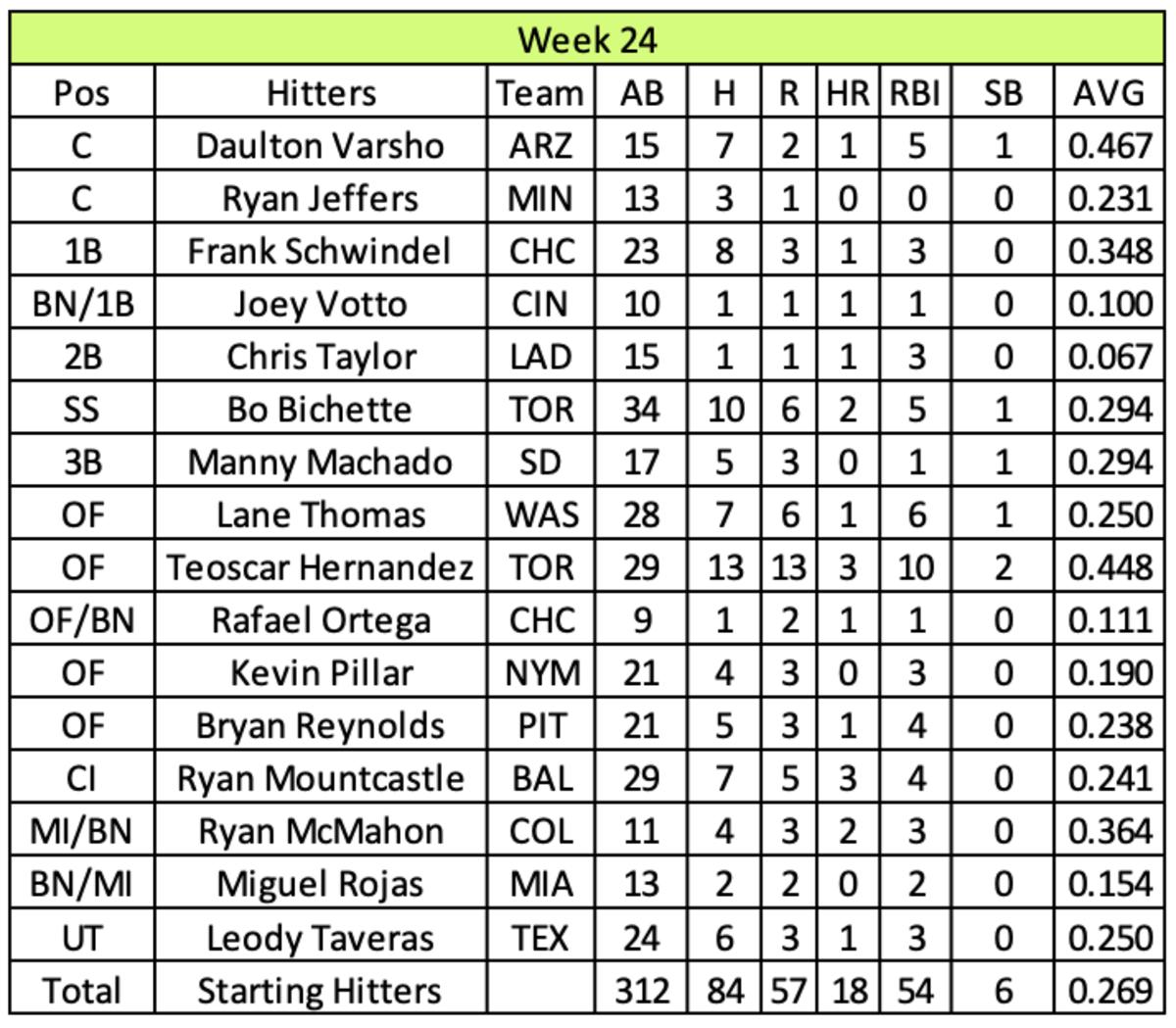
Dussault did his best to massage his hitting roster in September, but much of this week's success came from his core drafted players. Teoscar Hernandez led the way with 13 hits in 29 at-bats with 13 runs, three home runs, 10 RBI and two stolen bases. His team finished with an edge in runs (57), home runs (18), RBI (54) and steals (6). Dussault started all three of his pickups from the previous week, and they combined to go 17-for-73 with 12 runs, two home runs, 12 RBI and one steal.
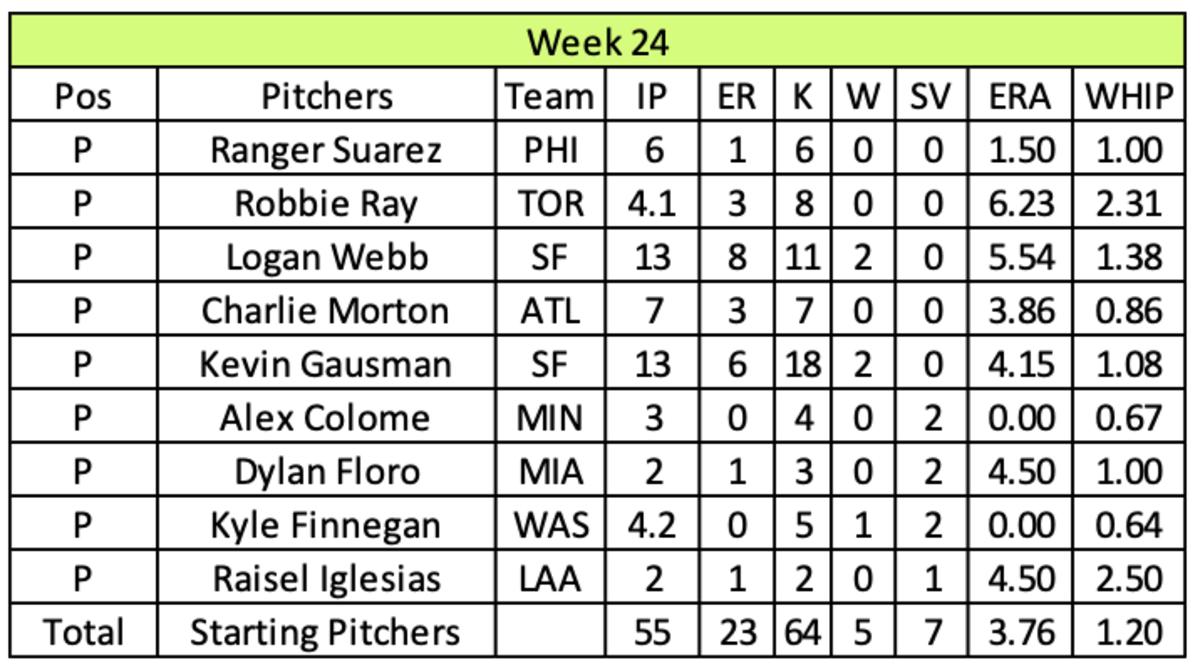
The four reliever plan worked to perfection again in Week 24 as they combined for a win and seven saves. Dussault’s starting pitching let him down in multiple starts, but Logan Webb (11 strikeouts) and Kevin Gausman (18 strikeouts) carried him to his quota in strikeouts (64) while adding four wins.

Dussault peeled back one of his top starters (Charlie Morton) in favor of another closing option (Andrew Chafin – $3). He also took a second dance with Yonny Hernandez ($4).
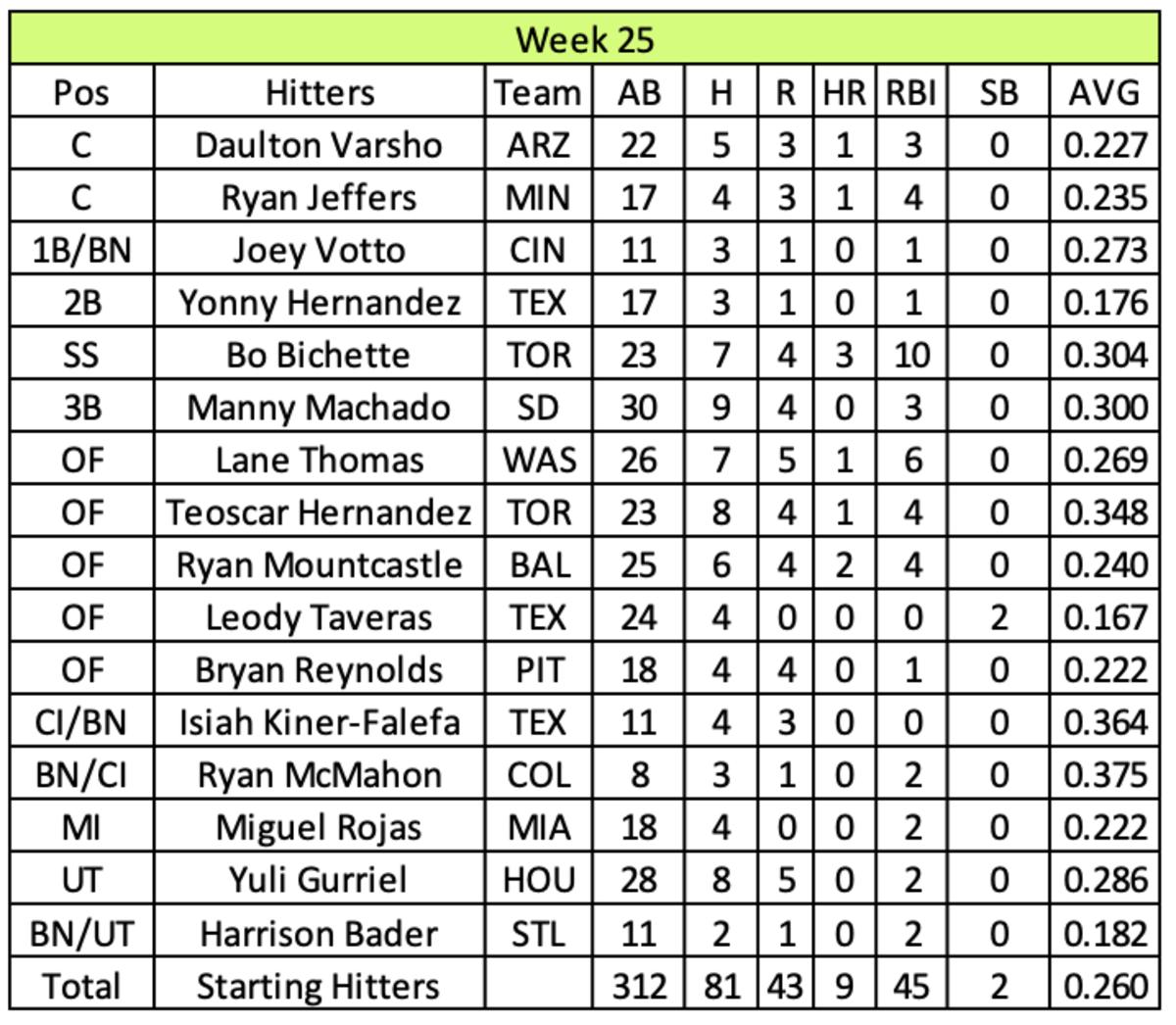
Dussault’s only two stolen bases in Week 25 came from Leody Taveras. Bo Bichette (.304/3/10) led his offense to a steady week in runs (43) and RBI (45) while missing his targets in home runs (9) and batting average (.260).
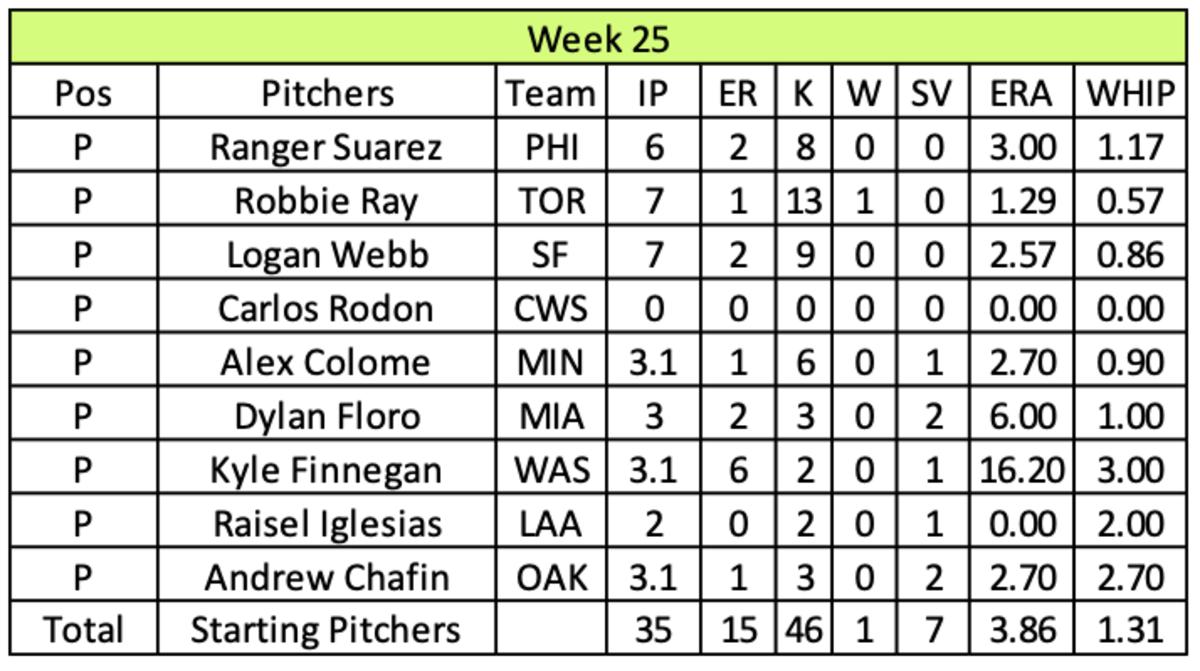
With massive separation from the field in ERA, WHIP and strikeouts, Dussault wheeled out five relievers in Week 25. They combined for another seven saves, giving him 39 saves over the previous seven scoring periods. Carlos Rodon gave him a zero for the week for the second time this season. His only win came from Robbie Ray (one run over seven innings with 13 strikeouts).

His focus in Week 25 on the waiver wire was the middle infield position. After dropping him two weeks ago, Dussault rebought Cesar Hernandez ($1). Unfortunately, Nico Hoerner ($1) failed to make an impact due to missing most of the final two months of the season. Michael Taylor ($2) was his only other addition.

The chase for steals materialized in Week 26. Dussault’s team finished with a season-high nine stolen bases. Harrison Bader went 10-for-15 with eight runs, three home runs, five RBI and two steals. However, Dussault did have an issue at second base (only five at-bats for the week). Manny Machado (.333/3/8) and Teoscar Hernandez (.269/3/6) were the other two star players for the week. Overall, his team only lost ground in RBIs (35).
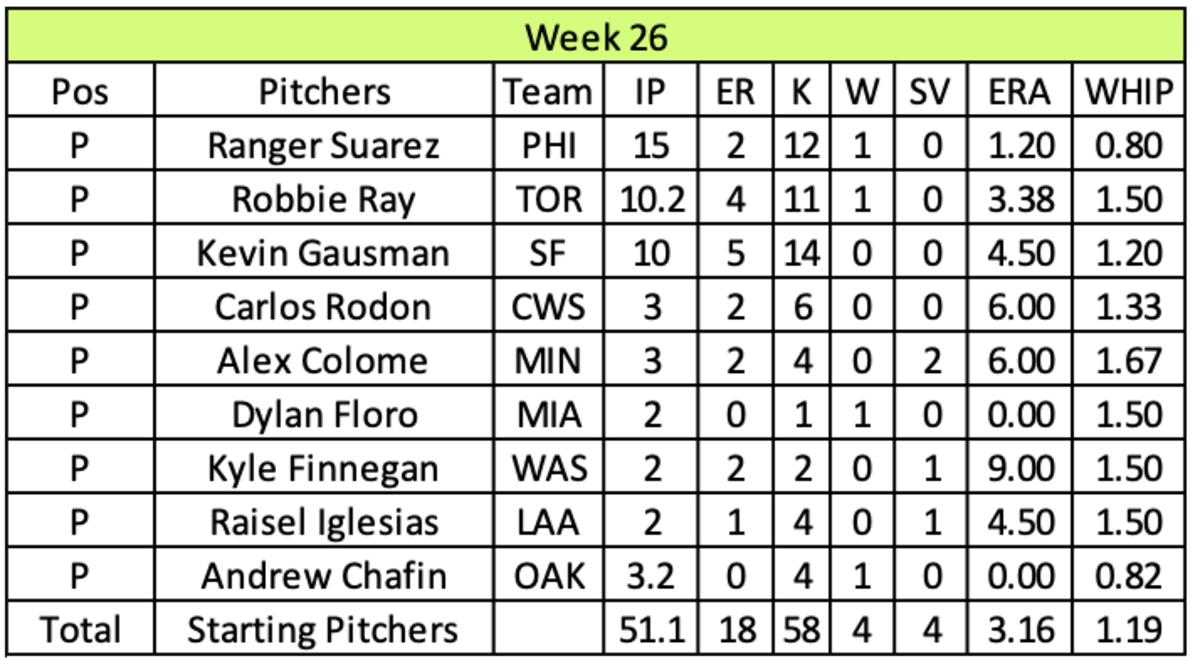
He stayed with the combination of four starters and five relievers. His top three starting pitchers (Ranger Suarez, Robbie Ray and Kevin Gausman) had double starts, leading to two wins and 37 strikeouts over 35.2 innings. His closers picked up two wins and four saves. For the week, Dussault maintained his edge in all five categories.

He added Nick Gordon ($2) and Yonny Hernandez ($2) with his final two additions. Both players offered more help in speed.
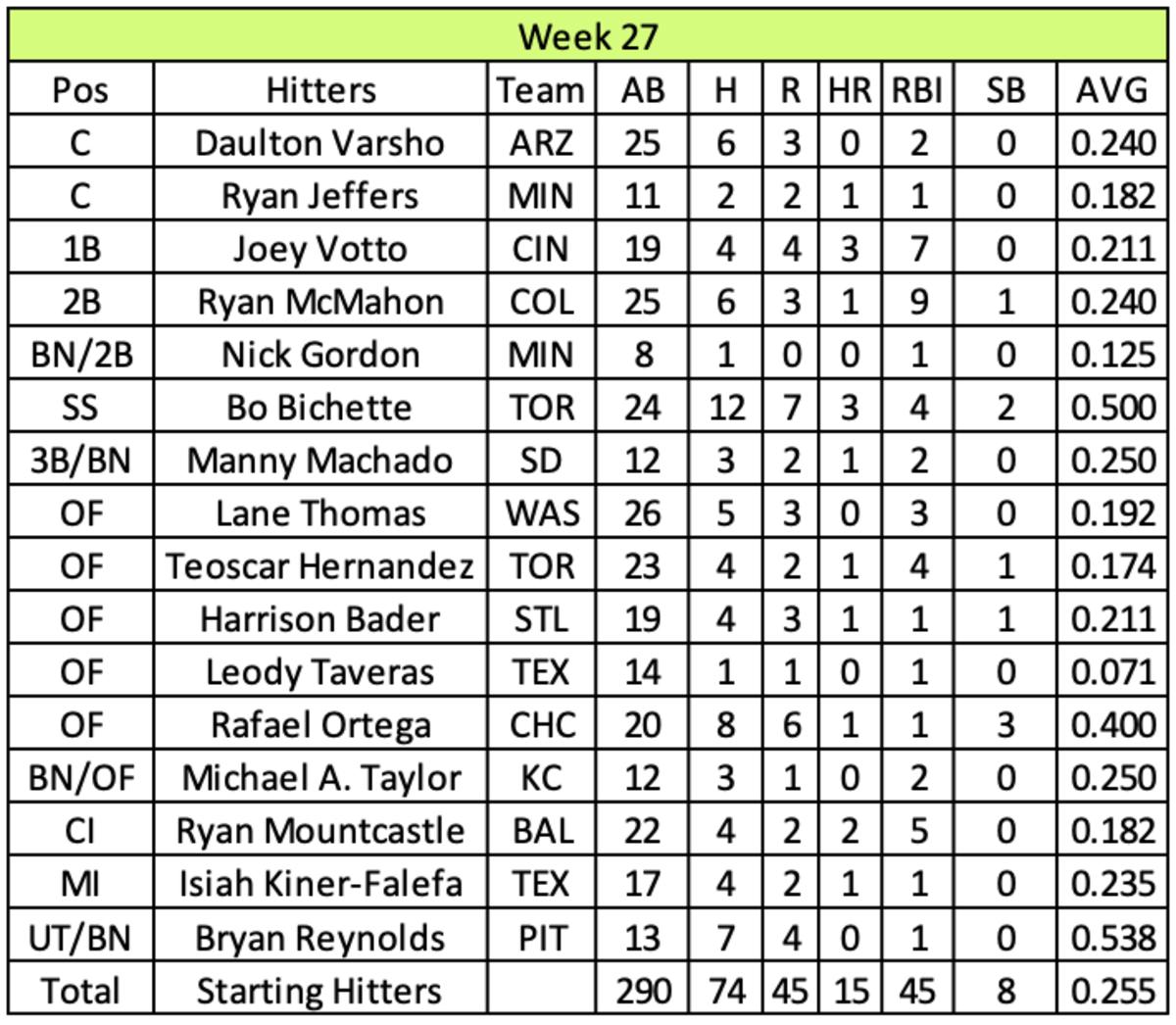
The season's final week ended with another steady offensive performance, highlighted by an uptick in stolen bases (8). Ten players hit home runs and all 16 of his starting players had at least one RBI. Bo Bichette finished the season with 12 hits in 24 at-bats with seven runs, three home runs, four RBI and two stolen bases.

With a comfortable lead in the overall standings, Dussault’s pitching staff cruised home with two wins, five saves and 47 strikeouts over 44.1 innings while posting another solid week in ERA (3.05) and WHIP (1.13). Logan Webb and Ranger Suarez combined to allow four runs over 19 innings with two wins and 23 strikeouts. Dylan Floro was the best arm in his bullpen in Week 27 (no runs over four innings with six strikeouts and three saves.
Final Notes
Dussault picked up 58 players on the year, which comes to $17.20 per player. His highest two winning bids were $94 and $85. For reference, his opposing bids came to $432 ($7.29 per player). Twenty-seven of his players added had no other recorded bids (other owners may have won players higher on their bid line).
His 12 catchers combined to hit .225 over 763 at-bats with 83 runs, 29 home runs, 88 RBI and five steals.
Dussault spent $235 (12 bids) of his $1,000 free-agent budget on catchers. He only added three starting pitchers (Alex Wood, Vince Velasque, and Tylor Megill) for a total investment of $85. Ranger Suarez ended up starting, but his initial investment came as a reliever. His chase for saves on the waiver led to $425 in spending on 20 arms.
Forty-eight of his 82 saves came via the waiver wire. Dussault’s bench pitchers had 19 wins, eight saves and 326 strikeouts over 291 innings with a 3.71 ERA and 1.17 WHIP.
Closing Thoughts
Last spring, I listened to the Pull Hitter’s Podcast, where Dussault floated the idea of streaming batters. The thought process made sense in the 60-game Covid-19 season in 2020, but I thought it would be harder to pull off over an entire season. In the end, his only streaming of hitters came at catcher. He came out of the draft with an excellent base to his offense as far as at-bats. Dussault fixed his two significant shortfalls with the additions of Cesar Hernandez and Joey Votto. After the All-Star break, he was in the right camps of multiple players gaining at-bats. Most of these options played well, and Dussault had them priced correctly in the free-agent market.
As for the pitching side, his team was full of aces despite some major injuries to his top arms. In addition, the depth and strength of his draft on the starting pitching side allowed him to avoid bad double starts on the waiver wire, plus open up roster spots to address his shortfall in saves. In the end, his early lead in ERA, WHIP and strikeouts allowed him the flexibility to run down the needed saves to win the overall title.
